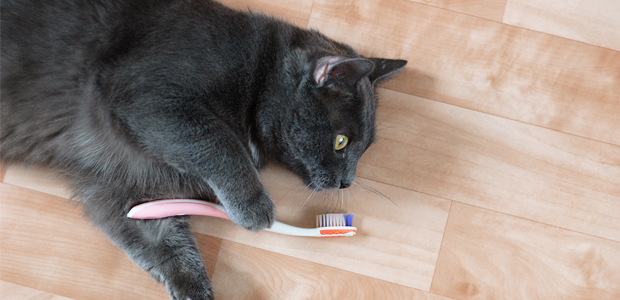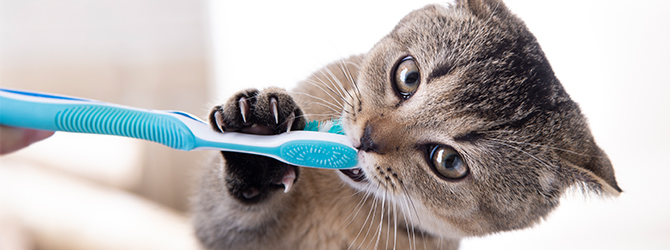How to brush cats teeth
Did you know that over 70% of cats develop gum disease by the age of three?
When caring for your cat, it can be easy to overlook the importance of caring for their teeth.
Dental care is very important in cats. We recommend brushing your cat's teeth 2-3 times a week to prevent the build-up of plaque. Watch our video guide below on how to brush your cat's teeth.
Do I need to brush my cat's teeth?
Yes, it is recommended that all cats have their teeth regularly cleaned. Brushing your cat's teeth will lower the risk of them developing dental diseases and other mouth-related illnesses such as gingivitis, of which the most common cause is the build up of a plaque and bacteria.
Cats are masters of disguise, and when it comes to showing pain, they often hide their discomfort. Because they can’t tell us when they’re in discomfort, it’s important to keep on top of their dental hygiene. Cats require regular dental care to prevent the build-up of plaque.
Remember, members of Pet Health Club get 10% off dental procedures.
Read More: Gingivitis in cats: symptoms and how to treat it
How often should I brush my cat's teeth?
Dental specialists advise that you should clean your pet's teeth every day. To see any real benefit from brushing, you should brush their teeth at least every other day.
Brushing regularly has the same benefits for your cat as it has for you. It removes stubborn plaque - the film of food and bacteria which coats the teeth and can cause gum disease.
If plaque builds up in your cat's mouth, it can harden into tartar, requiring special equipment to remove. Regular brushing also combats bad breath, which can come in handy after a tin of tuna.
If you notice your cat's gums are red and swollen or there is a lot of tartar build-up on the teeth, please contact your vet for advice before brushing your cat's teeth. These symptoms could mean that dental disease may already be present, making brushing painful for your cat and requiring treatment.

How do I brush my cat's teeth?
Brushing your cat's teeth can be quite tricky, as some cats may not allow you near their mouth. Be patient, and introduce regular sessions working towards tooth-brushing. If possible, you should follow our simple three-step guide.
Step 1
Use your finger to brush the side of your cat's face beside their mouth. Once your cat gets used to that feeling, progress to rubbing their actual teeth using your finger. Then, you can introduce a small amount of cat-safe toothpaste to your finger, gently rubbing it along the teeth.
Step 2
Now that your cat is used to having his teeth touched, introduce an actual toothbrush. You can get ones designed specifically for animal use to make things easier for you and your cat.
Step 3
Eventually, you should aim to spend around 2 minutes brushing all the surfaces in your cat’s mouth. Don’t worry if your cat doesn’t take to toothbrushing straight away; the more gradual the process, the easier it will be.
Introduce this process with short sessions initially, and give plenty of praise. As your cat gets used to it, extend brushing sessions to around two minutes, but remember always to praise and reward your cat so that the experience is a positive one.
Is there cat toothpaste?
Human toothpastes are not suitable for use on pets, as the fluoride content is too high. Always use a toothpaste specifically designed for cats. These are usually meat-flavoured, which cats much prefer over mint.
Healthy teeth make for happy pets, and investing in high-quality toothpaste could stop you from forking out on big vet bills in the future. By keeping on top of your cat's oral care, you can prevent the need for expensive tooth and gum treatments.
Visit our My Family Vets Shop to check out our AniDent range of vet-approved dental products. AniDent's easy-to-use dental range has been designed to help you provide your pet with the best oral care.
Understanding the importance of dental care in cats
Dental health is more than just keeping bad breath at bay; it's about overall well-being. Dental problems can lead to more serious health issues, including heart, liver, and kidney diseases, if left untreated. That's because the bacteria from dental diseases can enter the bloodstream and spread to other organs, affecting your cat's overall health.
Signs of dental problems in cats
Look for signs that might indicate your cat is struggling with dental issues. These include:
- Bad breath
- Difficulty eating or loss of appetite
- Drooling
- Yellow or brown tartar on the teeth
- Swollen or bleeding gums
- Pawing at the mouth or face
If you notice any of these signs, it's time for a trip to the vet. They can give your cat a thorough dental check-up and recommend the best way to clean your cat's teeth.
Diet and dental health
What your cat eats plays a role in their dental health. Dry food is often recommended because it helps scrape off plaque from the teeth, much like a toothbrush does. There are also special dental diets designed to reduce tartar and plaque build-up. However, choosing a high-quality diet that meets all your cat's nutritional needs is important.
Consult with your vet to find the best option for your cat.
Dental treats and toys
Dental treats and toys can be another fun way to help keep your cat's teeth clean. These products help reduce plaque and tartar build-up while your cat chews on them. However, they should not replace daily brushing, but they can help.
Professional dental cleanings
Even with diligent at-home care, your cat might need professional dental cleanings from time to time. These cleanings allow the vet to remove tartar and plaque you can't get rid of with brushing alone. Your vet can also check for any signs of dental problems that might not be visible to the naked eye and provide treatment if necessary.
Taking care of your cat's dental health is a key part of their overall care. It requires effort, but keeping your cat happy, healthy, and pain-free is worth it.
Need more advice on cleaning your cat’s teeth?
For expert advice on cleaning your cat’s teeth, get in touch with your local vet. Find your nearest vet using our Find a Vet page, or speak to a vet online using Online Vets.
Remember, prevention is always better than cure, so start taking steps today to protect your cat's teeth. Members of Pet Health Club get 10% off dental procedures.




